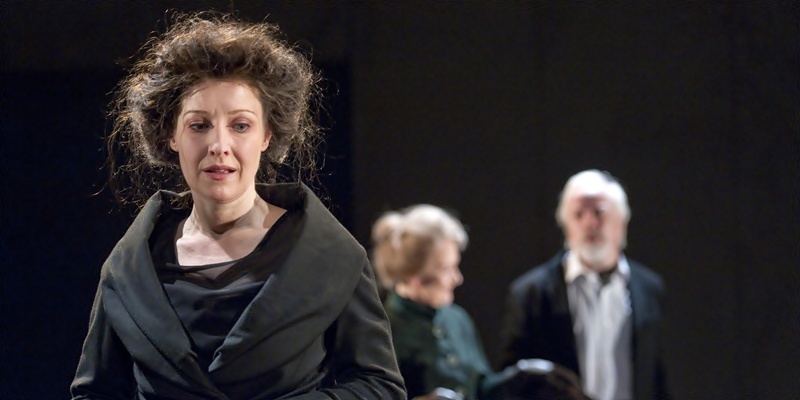Staging a version of an epic Russian novel that is thought to be one of the greatest works ever written is not a straightforward task, but Dundee Rep succeeds in conveying the complexities of 19th-century life, love, politics and propriety in its new production of Leo Tolstoy’s Anna Karenina.
Directed by associate director Jemima Levick, the adaptation by Jo Clifford is a 2-hour journey that sees the Rep Ensemble members stretched to their limits, playing everything from peasants, fathers, mothers, servants and counts to doctors, socialites and priests.
From the outset, there is a welcome mix of drama and humour; the latter mostly thanks to the excellent Robert Paterson, who portrays the self-centred and unfaithful husband of Darya (Irene Macdougall) superbly, as well as other minor parts including a gossipy socialite and a wonderfully indifferent medic.
As Anna Karenina, Emily Winter is poised and level-headed, even capable of advising sister-in-law Darya how to cope with her husband’s infidelity.
But, as she faces the choice between a loveless marriage of duty with Karenin (John Buick) and the lure of a sensual and life-changing relationship with young and dashing soldier Alexis Vronsky (Tony McGeever), her resolve begins to fade.
Winter carries the part well, displaying the complexities of Anna’s public and private faces and the desires that threaten to tear her and her family apart. She allows Anna’s strength to slip very gradually, as she embraces the ‘crime’ of loving another and, in doing so, ultimately sealing her own fate and descent into misery and depression.
Anna’s relationship with Vronsky can feel rather empty at times, and it is unclear if this is due to an attempt to demonstrate the pressures of social propriety or a simple lack of chemistry between Winter and McGeever, who plays the soldier with reserve, seldom conveying heightened emotion.
The difficulty of a play adapted from an 800-page epic is that no one theme can be given the attention it truly merits. And, due to the number of characters required by the production coupled with the constraints of a small ensemble group, the playing of multiple parts can occasionally result in ambiguity.
The production moves at pace through a multitude of lives and situations and, wherever there is an absence of depth or emotion, the scene is cleverly enhanced by Chris Davey’s dramatic lighting, inspired video projection designed by Lewis Den Hertog and music by Aly Macrae.
The projections suggest place and setting as well as character motifs; for Anna, black and blood-coloured ink spreading like a poison when she faces trouble or flying train sparks for Vronsky.
Another dimension is the conflict between city and countryside at a time when the railway was beginning to rear its head in Russia. From the sounds of a train making its way down a line, to the appearance of tracks and steam on stage, it is a theme carried throughout as the play nears its climax.
The idea that the ills of industrialisation can be cured by country living is pondered well by Constantin Levin, played by the excellent Kevin Lennon. Levin is used as a vehicle for Tolstoy’s theories on agriculture and peasants, and his musings on how best to work the land are effective without being preachy.
Levin’s relationship with the strong-willed Katy (Helen Darbyshire) is also the most plausible in the production, with both actors showing warmth and a genuine rapport.
Clever staging means that, on many occasions, situations are being played out simultaneously to demonstrate the characters’ contrasting fortunes. Just as Anna’s world begins to fall apart, and she is turned into a criminal and martyr, relationships blossom and new life comes.
Lives rotate like the wheels of the train Anna keeps fixed at the back of her mind. They turn, swapping from love to hate, countryside to city, but ultimately never evolve.
For the set, designer Alex Lowde has stripped the Rep’s stage back to its barest form, and the space enables the layers of storytelling to unfold.
At the front of the stage, a church candle lit beside an icon of the Virgin Mary burns throughout the drama, serving as a constant reminder of a world where propriety and possession take precedence over emotion.
Anna Karenina is renowned as a great epic, and the play is no different. It is an epic undertaking for Jemima Levick and her team, who have faced the difficult task of juggling themes, emotions and time head on.
Ultimately, it pays off.Anna Karenina runs at Dundee Rep until June 11. Visit www.dundeereptheatre.co.uk for more information.All photos Dundee Rep / Douglas Robertson.
